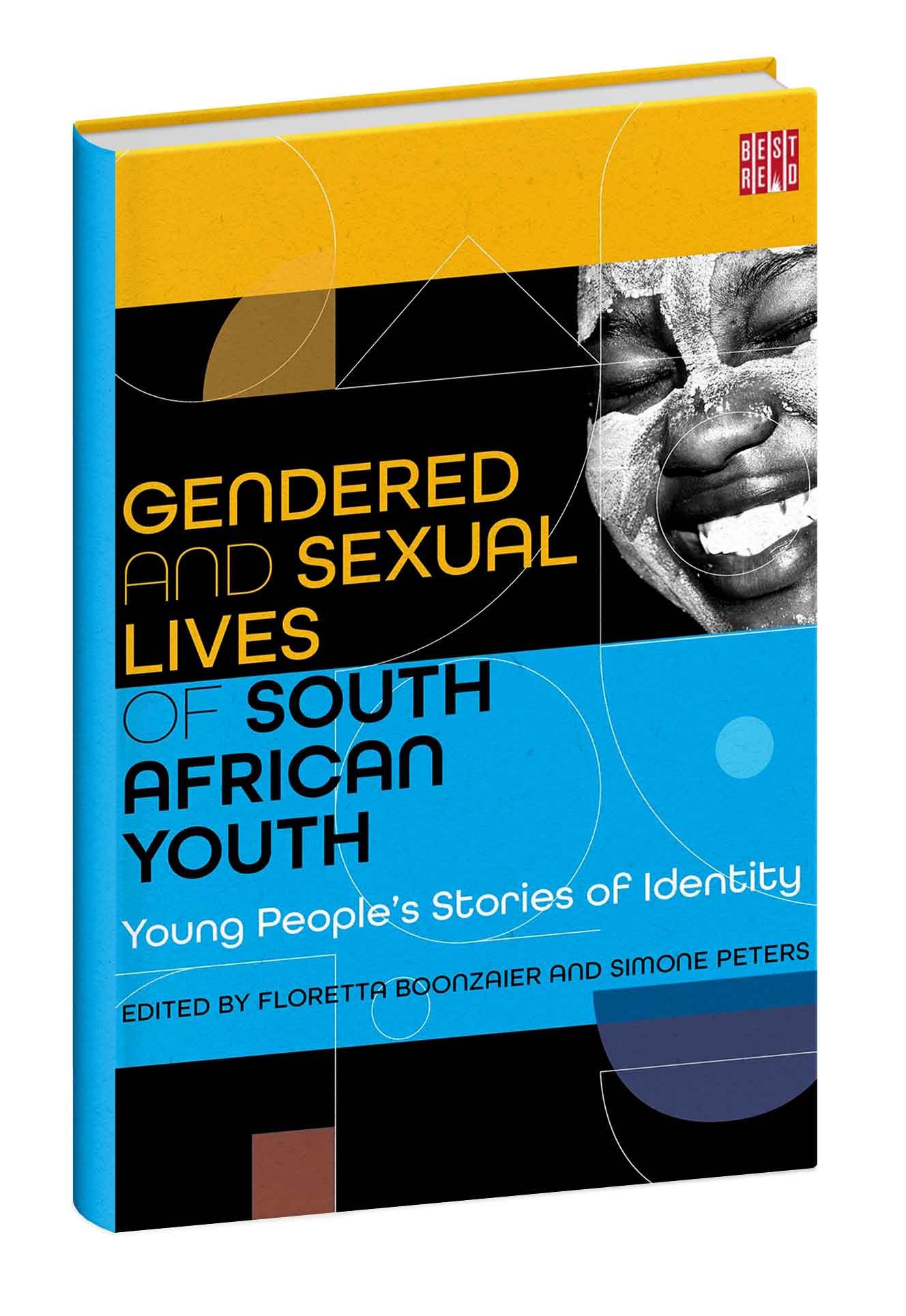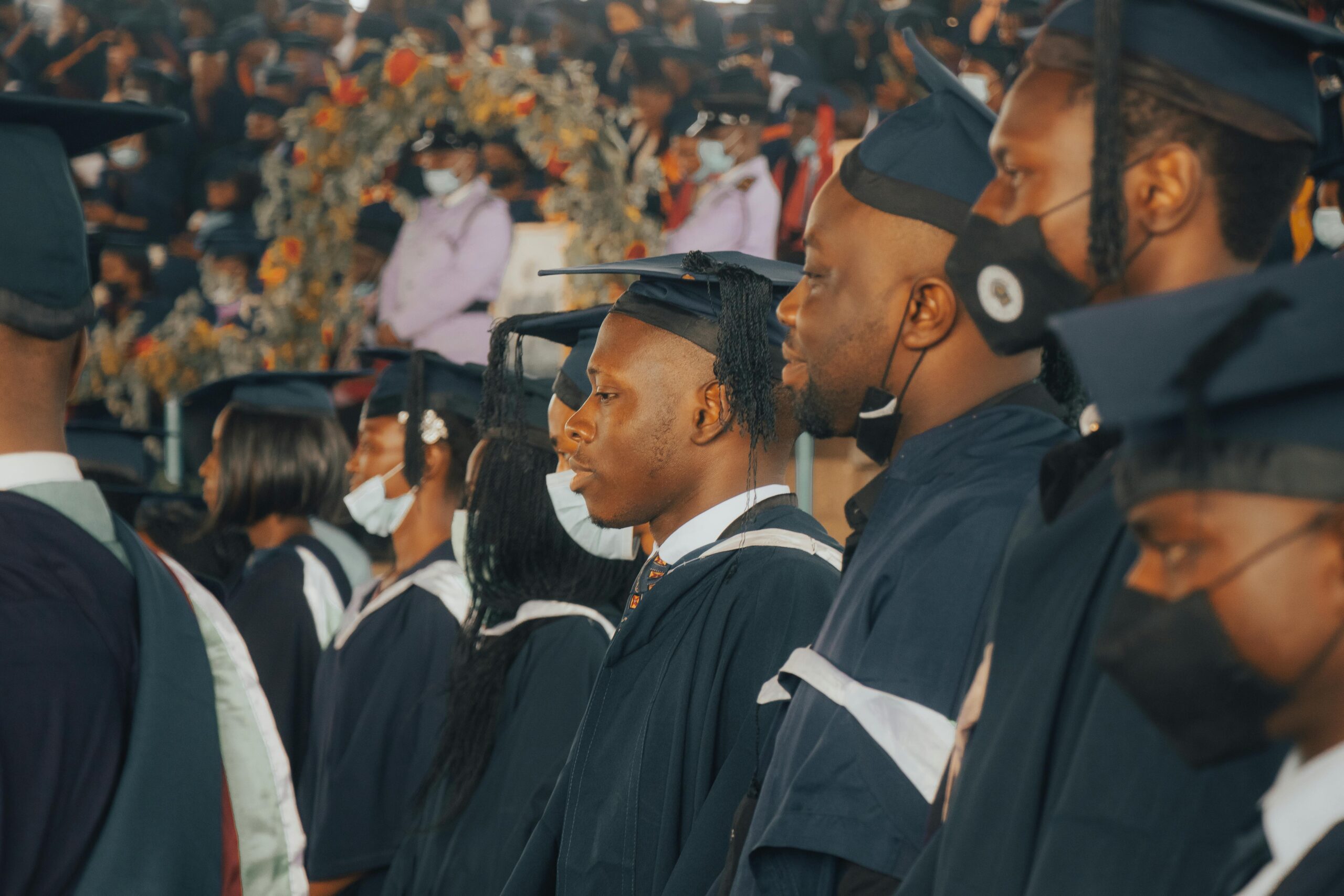Each year, the South African Social Attitudes Survey (SASAS) asks a representative sample of South Africans about aspects of life in the country. 2023 represents the 20th anniversary of this HSRC flagship project, with Round 20 of surveying completed in October. Drs Ben Roberts and Jarè Struwig reflect on the experience of measuring and monitoring social, political and moral attitudes over the past two decades.
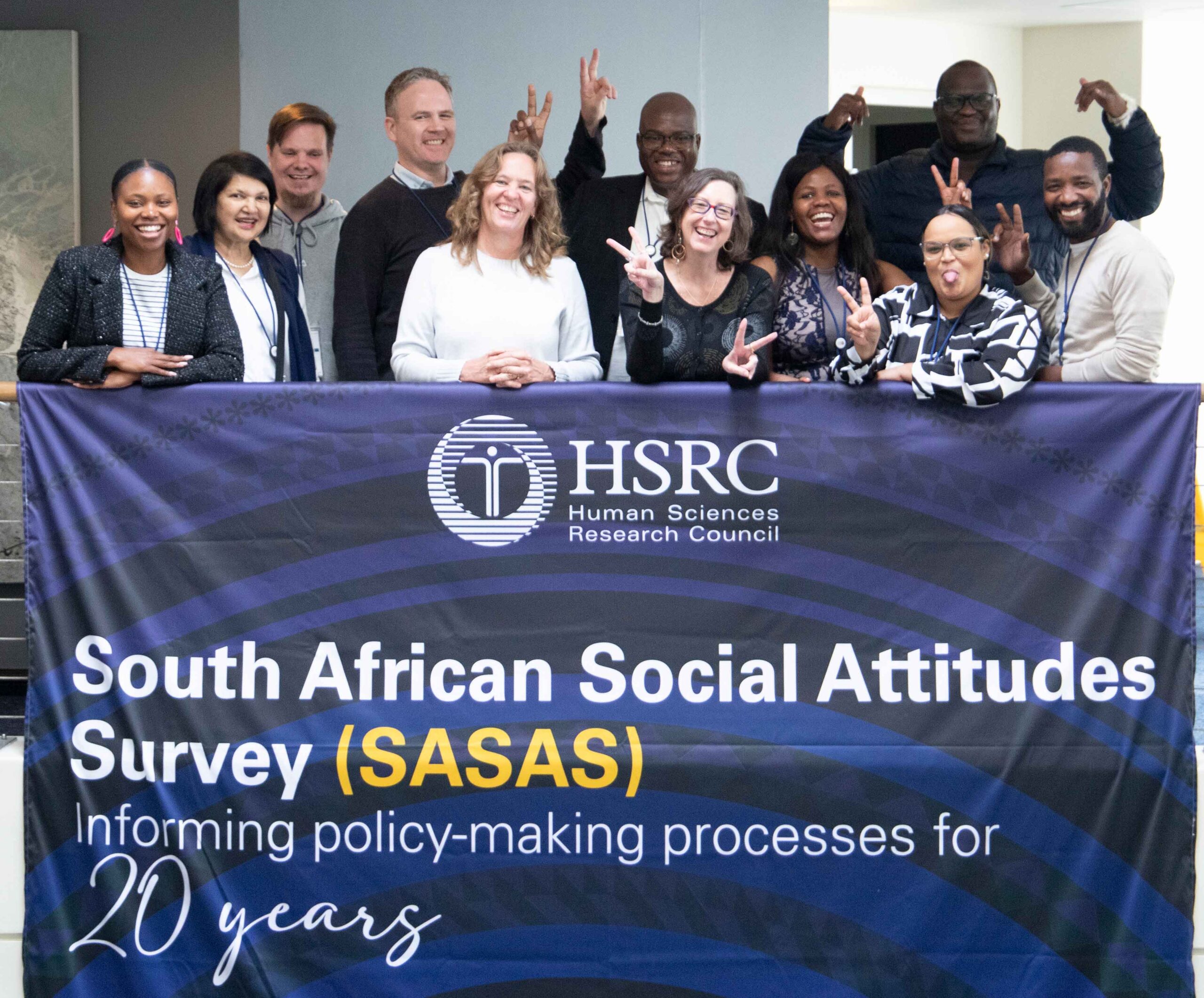
SASAS colleagues at the HSRC Research Conference, 2023. Photo: HSRC
Since 2003, the South African Social Attitudes Survey (SASAS) has surveyed the public to track their views about important societal issues, including democracy, service delivery, public spending, taxation, xenophobia, financial literacy, voting, abortion, the environment, and much more.
This annual survey is a nationally representative, repeated cross-sectional survey and was established under the guidance of former HSRC CEO, Dr Mark Orkin, and executive director, Dr Udesh Pillay, with expert advice from the late sociologist Prof. Sir Roger Jowell. Originally from South Africa, Jowell founded the British Social Attitudes Survey (1984–) and the European Social Survey (2001–). He was president of the University of Cape Town’s Student Representative Council and vice-president of the National Union of South African Students. Leaving for the UK in the late 1960s, he went on to be a leading expert in national and cross-national survey research. He served as special advisor to SASAS until his passing in 2011, and indelibly influenced its structure, content and quality standards.
Each SASAS round is designed to yield a representative sample of 3 500 individuals aged 16 years and older in households which are geographically spread across the country’s nine provinces. Random probability sampling ensures that everyone has an equal chance of being picked, so the results are representative of the South African population.
The SASAS questionnaires cover a wide variety of topics, with core questions repeated in each round of the survey to monitor change and continuity over time. In addition, rotating modules on specific themes are fielded to provide detailed attitudinal evidence to inform policy and academic debate. Collecting this data over multiple years has enabled us to track notable trends and discern where views have changed or stayed the same.
Impact and influence
A few examples of how public opinion, and SASAS in particular, has interacted with policy over the years are provided below.
Power to the people? Democracy and governance
The SASAS series has consistently tracked different measures of political support in the country, including satisfaction with democracy as well as trust in government and other core political institutions. Corresponding with a global downturn in democratic evaluations over this period, these indicators have shown a steady decline, with satisfaction and trust levels more than halving since the mid-2000s (Figure 1 a and b).
For example, 48% of South Africans were satisfied with democracy, but this has changed over the 20-year period and in 2022 only 22% of South Africans were satisfied with democracy. Confidence in national government fell from 69% in 2004 to 23% in 2022, trust in Parliament from 65% to 21%, and trust in local government from 48% to 25%, with similar trends for courts of law, political parties, and politicians. The biggest falls coincided with high-profile government scandals. Attempts by successive government administrations to reverse this decline have not yet succeeded in doing so.
Figure 1 a. Satisfaction with democracy, 2003–2022
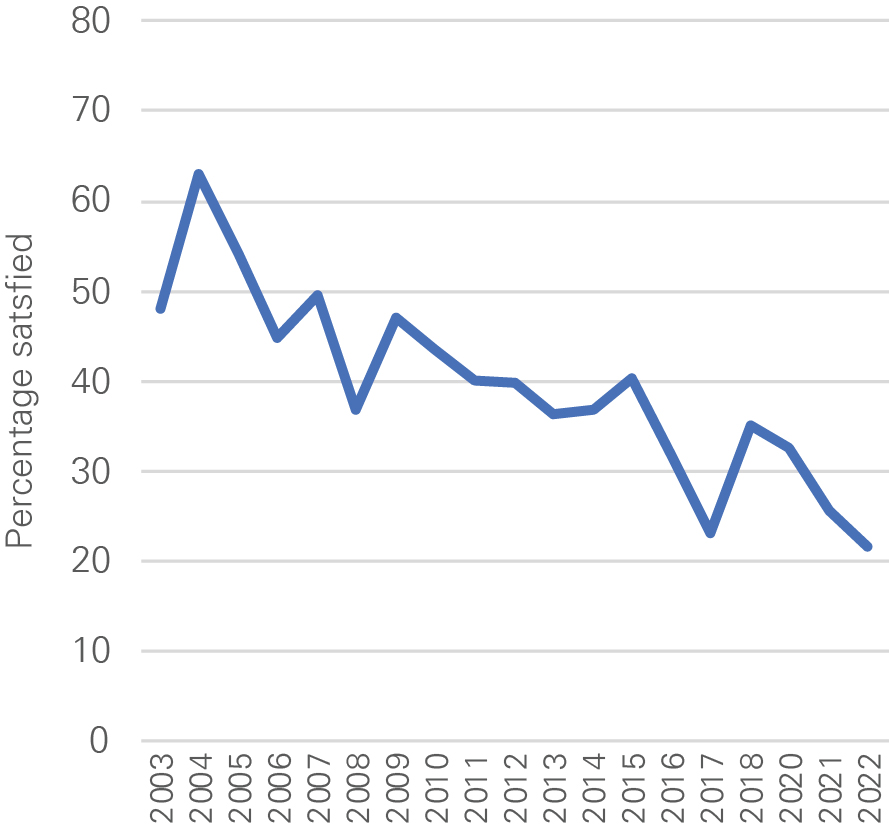
Source: SASAS
Figure 1 b. Trust in the three branches of government, 1998–2022
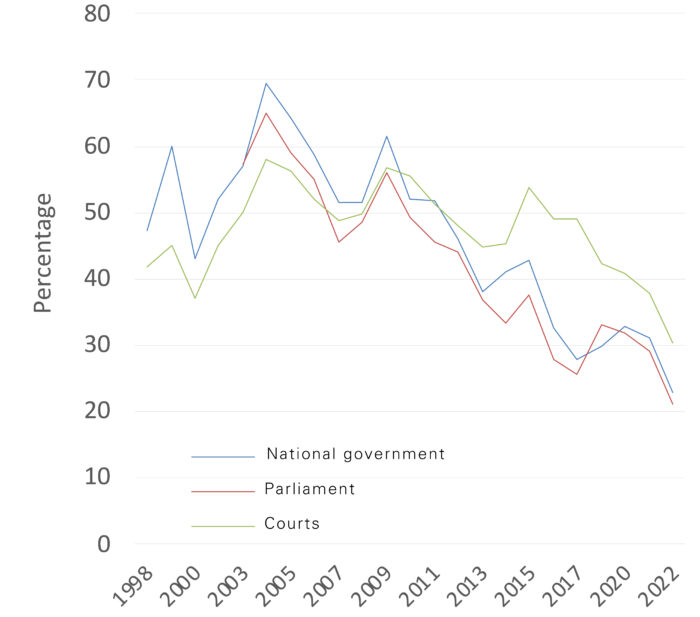
Source: SASAS
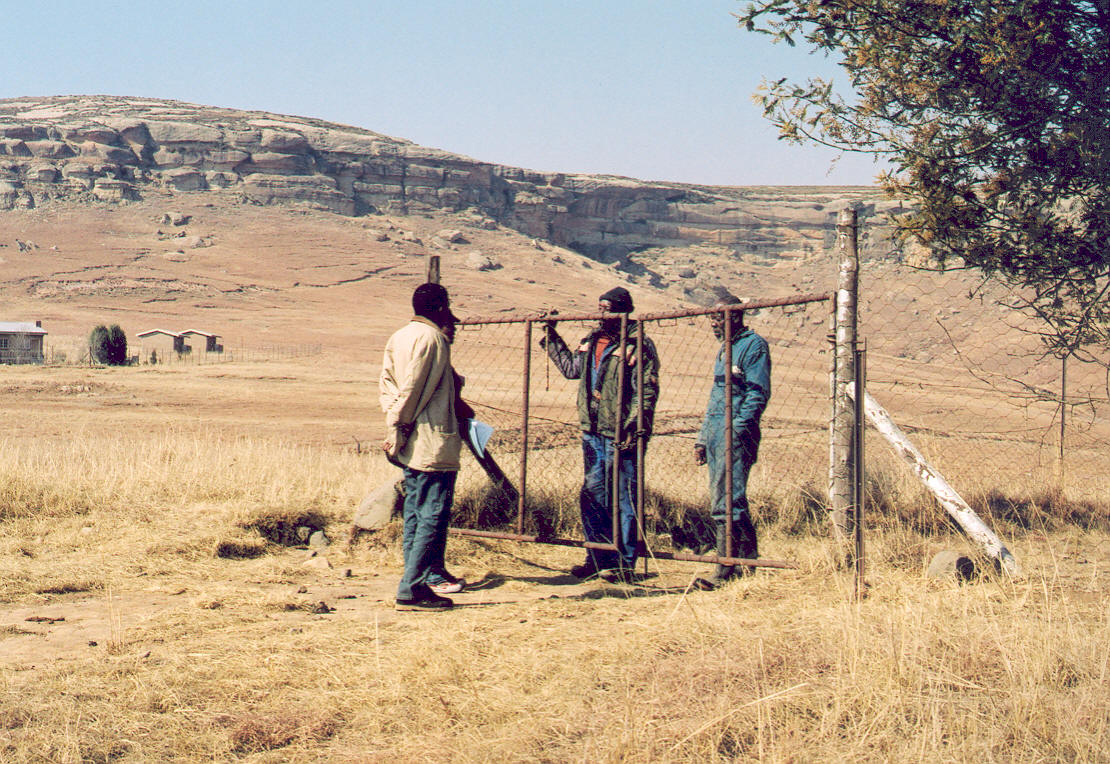
SASAS fieldwork in 2003 Photo: HSRC
Bridging differences: Social cohesion
Intergroup relations have been enduring themes throughout the survey series, especially relevant in a diverse country still dealing with the pain and trauma of historical injustices and promoting the moral philosophy of ubuntu (humaneness) in our daily interactions. A range of commissioned research has also been undertaken over the years, on themes such as multidimensional social cohesion, family cohesion, xenophobia, as well as sexual orientation and gender identity. These have all had policy or advocacy firmly in mind.
Figure 2a. Percentage stating that two adults of the same sex having sexual relations is ‘always wrong’ or ‘not wrong at all’ (2003–2022)
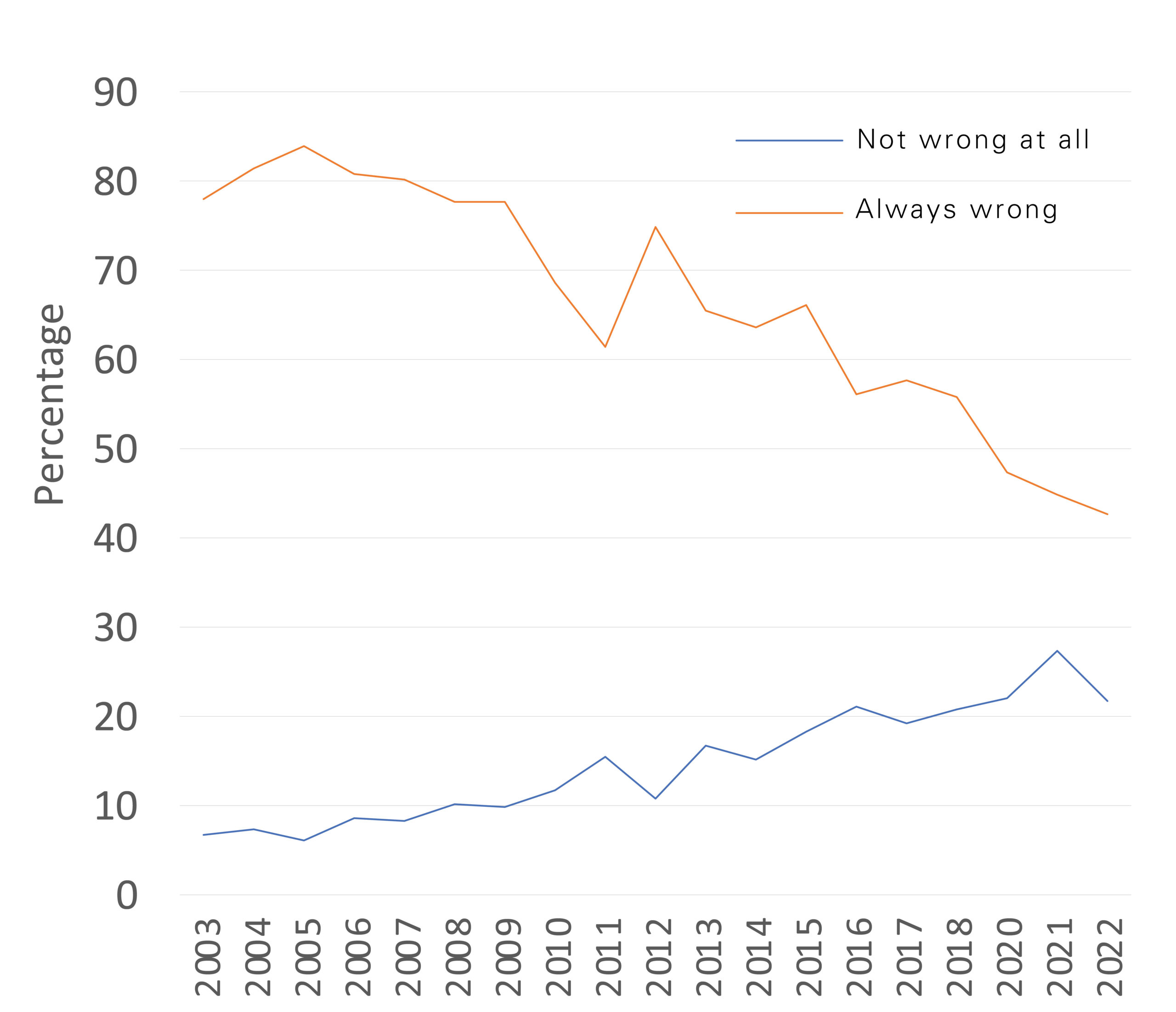
Source: SASAS
Figure 2b. Percentage stating that race relations in the country have improved since 1994 (2003–2022)
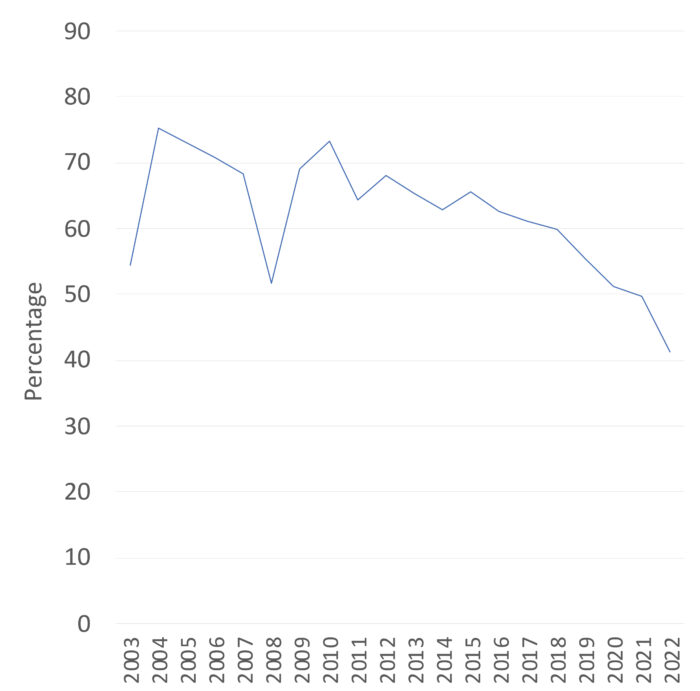
Source: SASAS
Patterns tend to be mixed. For instance, there are distinct signs of a change in views on LGBTIQ+, with a clear shift towards greater tolerance (Figure 2a). Conversely, attitudes towards foreign nationals have remained intractably harsh, with barely a quarter (22%) willing to welcome all immigrants to the country in 2022 (results not shown). Views on improved race relations since the transition to democracy in 1994 were mostly encouraging until 2015, after which a progressive decline has been observed (Figure 2b).
A world of difference: International partnerships
Comparing the views of South Africans on issues of national priority to those of citizens in other countries is essential for gaining a more nuanced understanding of our society, and the ways in which it is similar to or different from others. Through SASAS the country is a formal member of the International Social Survey Programme (ISSP), a partnership of more than 40 countries that annually fields an in-depth module of questions on topics of global relevance. ISSP topics have included: social networks; national identity and citizenship; work orientation; the role of government; religion; social inequalities; the environment; health; and family and changing gender roles.
Figure 3. Belief in climate change reality: South Africa compared to Europe (%, 2017), ranked low to high based on the belief that the climate is probably or definitely changing
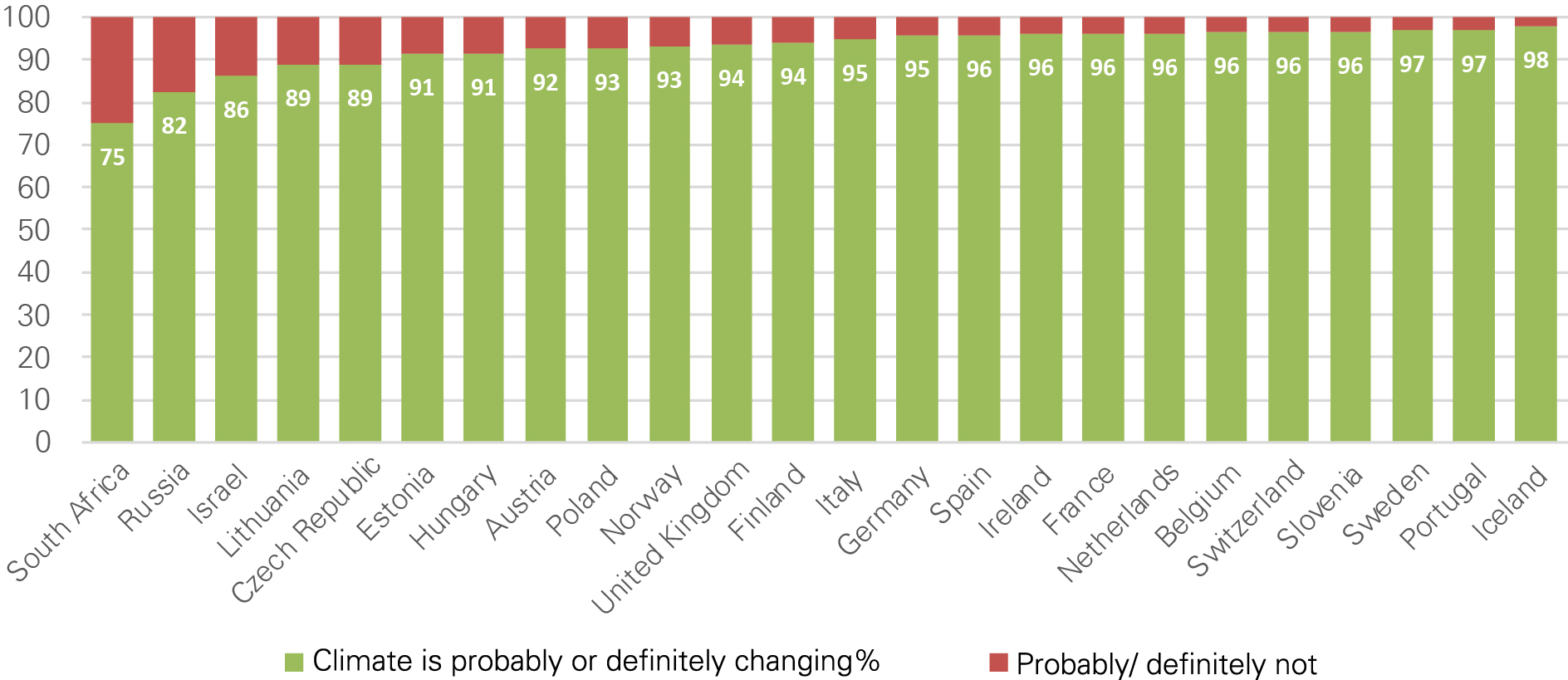
Source: SASAS
Strong linkages have also been developed with the European Social Survey (ESS). Apart from harmonising measures on topics like fear of crime, xenophobia, race relations, and social trust, SASAS has also fielded ESS modules on social inequalities in health, criminal justice, attitudes towards democracy, social policy, and climate change and energy.
These continued international engagements have enriched the evidence base to inform decision making. One example includes attitudes regarding climate change (Figure 3). Despite greater awareness of our changing climate over the last 15 years, South Africans tend to display more climate change scepticism than citizens of other countries. In a 2017 comparison of 24 countries, South Africans were least likely to believe that the world’s climate is changing. The value of such comparative analysis is that it broadens our perspective and helps with the development of effective policies in the country.
Going to scale
In setting up the SASAS infrastructure in the early 2000s, one of the guiding aims for the series was to gain recognition for reliable social indicators and attitudinal measures as the basis for evidence-based decision making in the country. We have seen encouraging signs in this regard over time, as the demand for SASAS-based insight from government departments has grown.
This has resulted in dedicated survey questionnaires on election beliefs and behaviour for the Electoral Commission of South Africa, financial literacy surveys for the Financial Sector Conduct Authority and National Treasury, and even a baseline Public Relationship with Science survey in 2022 for the HSRC’s parent ministry, the Department of Science and Innovation. Modules have been prepared for the Department of the Environment and the Presidential Climate Commission, as well as the Departments of Social Development and Defence, to mention just a few.
Through these and other contributions, SASAS is playing a role in the growing culture of data-led policy making. Similar commissioned research has been undertaken based on grants from local and international charitable foundations and agencies as the basis for framing campaigns and strategies.
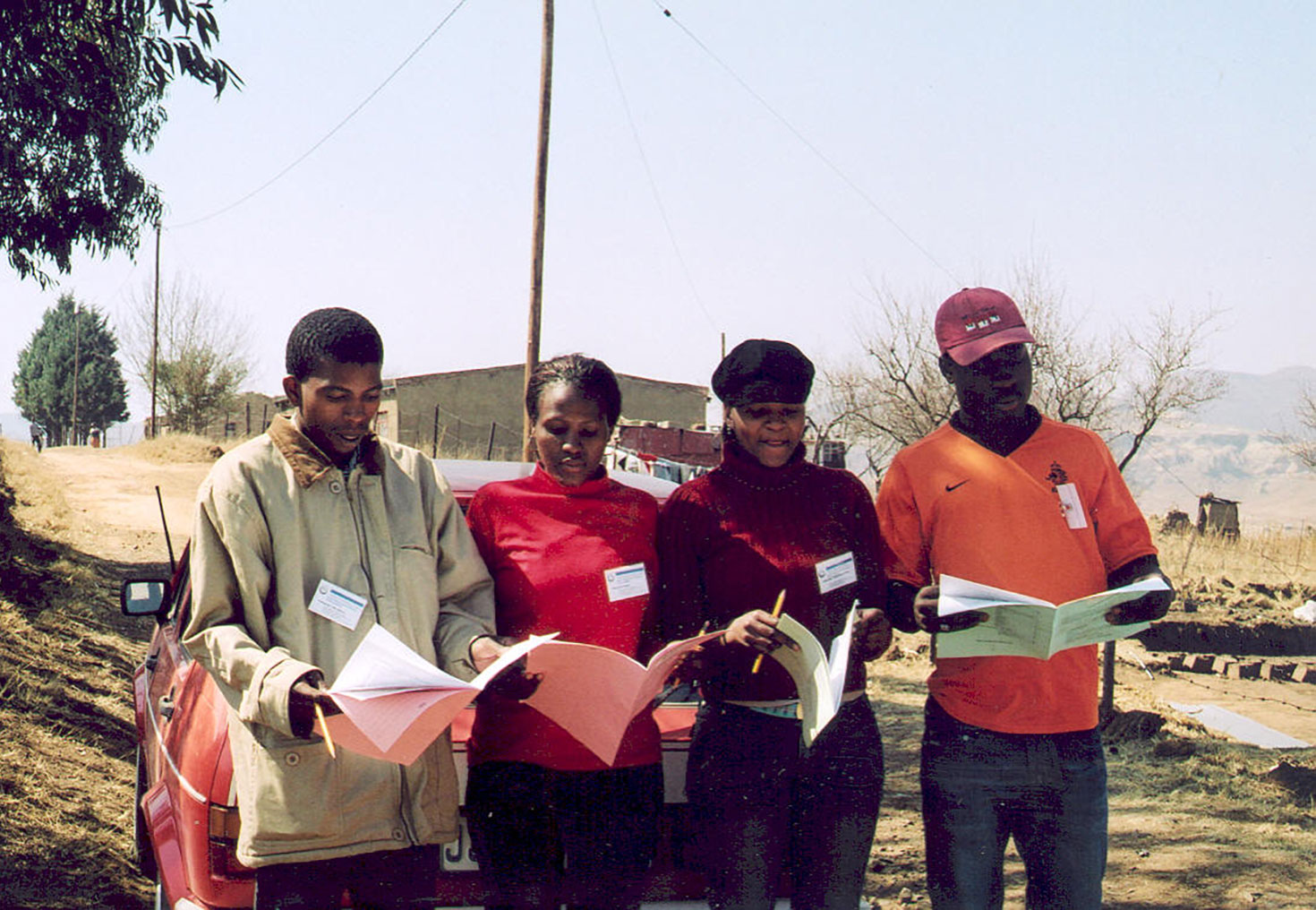
SASAS fieldworkers in 2003 Photo: HSRC
Blues skies: Elements of the experimental
Beyond the routinely fielded survey content, each round has intentionally included an element of the experimental, to provide new insight on underrepresented topics. This is crucial for growing scientific understanding of societal dynamics in the country. Examples have included attitudes towards ilobolo (bride wealth), decolonisation, restitution, homelessness, the lived experience of inequality, materialism, and the social norms of corruption.
| Experiences of young and emerging scholars working as part of the SASAS team | ||
| “ My invested time in the SASAS project has been beyond improving myself, but has also been an integral part of developing others through research.” ~ Samela Mtyingizane, SASAS researcher completing a PhD in Development Studies from UKZN on attitudes towards the decolonisation of education | “ My time with the SASAS team has been truly rewarding … This journey has not only deepened my understanding of the challenges faced by ordinary South African citizens … it has also equipped me with the ability to think about recommendations and solutions to address some of these issues.” ~ Dr Thobeka Zondi, HSRC SASAS researcher and former DCES PhD intern; graduated with a PhD in Public Administration, UKZN | “ The SASAS project has been instrumental in fostering my growth as both a scholar and researcher … being a member of SASAS provided valuable experience that informed my doctoral studies and other facets of my academic career. Here’s to another two decades of SASAS.” ~ Ngqapheli Mchunu, HSRC DCES senior researcher; he will graduate with a PhD in Political Science from Stellenbosch University late this year |
Capacity development
A SASAS-aligned internship programme has been established where students at master’s and doctoral level can work with the SASAS core team, gain exposure to all aspects of survey methodology, identify a thematic interest for dissertation purposes, and gain publishing experience. There is a strong emphasis on promoting data usage at universities for the purposes of instruction and studies. We would like to see the survey increasingly employed as source material for dissertations and peer-reviewed publications, and as an instrument for providing students and researchers with skills in the analysis of microdata and survey methodology.
Continuity and change: Looking to the next 20 years
A short reflection piece such as this can never do justice to the breadth and depth of the survey evidence generated and contributions made to decision making over two decades, and the many milestones and achievements. Perhaps one of the highlights of the flagship survey series that speaks to the objectives of SASAS was being awarded the National Science and Technology Foundation’s Data for Research Award in 2017 for its role in advancing social science knowledge in the country.
In the spirit of high-quality attitudinal research, our hope for the next two decades of SASAS and beyond is to carry on monitoring continuity and change in South African society, while maintaining a comparative understanding of dynamics in the country through the perspective of the public. Experimentation will continue to be key. To this end, from 2024 onwards the SASAS team will run an internal competition for HSRC young and emerging scholars to propose the topic of a survey module. Through this input, we hope the spirit of innovation and insight that has guided us will endure.
The phrase ‘standing on the shoulders of giants’ is wholly appropriate when thinking of the innumerable contributors to SASAS over the years. These include past and present CEOs, executives, directors, and special advisors, as well as a truly phenomenal survey research and administrative team. We wish to acknowledge the special role of our data collectors, who brave inclement weather and a range of unforeseen circumstances to ensure that high-quality data is gathered.
Above all, we are deeply indebted to the thousands of South Africans who voluntarily open their doors, hearts and minds each year in the pursuit of better understanding our society. Siyabonga kakhulu!
Authors: Drs Ben Roberts and Jarè Struwig are coordinators of the South African Social Attitudes Survey in the HSRC’s Developmental, Capable and Ethical State research division
Email contacts: broberts@hsrc.ac.za; jstruwig@hsrc.ac.za
The SASAS dataset collection can be viewed and downloaded here.

